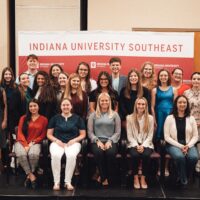Reduce Bias in Language
SHOW RESPECT. GAIN CREDIBILITY.
The Reducing Bias in Language campaign is sponsored by the campus diversity coordinators. The campaign emphasizes guidelines found in the Publication Manual of the American Psychological Association (6th ed.). The guidelines are intended to help the academic community treat others fairly and avoid perpetuating demeaning attitudes and biased assumptions about people in our speech and written communication. Poster messages with examples are listed below. For more information, please contact Campus Life, UC 010, (812) 941-2316.
Be sensitive to issues of labeling people or groups
Examples:
- Labeling categorizes people as objects. People should be treated with dignity and respect.
- Instead of gays, use gay men.
- Instead of the elderly, use older person.
- Instead of schizophrenic, use schizophrenic people or people with schizophrenia.
- Other labels considered insensitive include: four eyes, dumb blonde, ghetto, inbred, Jap, nerd, stoner, cripple, invalid, and various other racial or ethnic slurs.
- Using insensitive terms reinforce prejudice behavior.
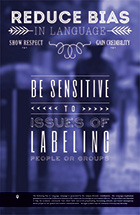
Avoid using historically inaccurate terms; over time, designations can become dated and something negative
Examples:
- Instead of Negro, use African American.
- Instead of homosexuals, use gay men or lesbians.
- Instead of Oriental, use Asian American.
- Instead of Indian, use American Indian or Native American.
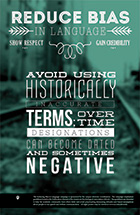
Differences should be mentioned only when relevant
Examples:
- Marital status, sexual orientation, racial and ethnic identity, age, or the fact that a person has a disability should not be mentioned gratuitously. Use gender-free language when possible.
- Instead of mankind, use humanity or people.
- Instead of man-made, use artificial.
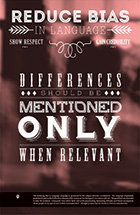
Call others what they prefer to be called. Don’t know? Ask!
Examples:
- Make an effort to determine what is appropriate for each situation. Ask people what they prefer, which designations they prefer, particularly designations debated within groups such as African American or black, Hispanic or Latino/Latina, and queer or gay.
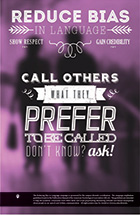
Use people-first language to create positive attitudes toward people with disabilities
Examples:
- People with disabilities are people first. Disabilities do not define people. A disability is relative to the degree the individual is supported by the physical and social environment.
- Avoid “handicapping” language such as stricken, bound, confined, victim, defective, or damaged. Use nonjudgmental terms and phrases that portray an image of dignity and respect. Use patient only when a person is under a doctor’s care.
- Instead of the crippled, use people with a physical disability.
- Instead of retards, use people with cognitive or intellectual impairment.
- Instead of crazy people, use people with a psychiatric disability.
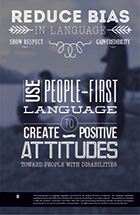
Do not use a term perceived as pejorative or derogatory
Examples:
- If a term perceived as pejorative or derogatory is used, you need to find a more neutral term. Racial slurs are pejorative or derogatory. Abbreviations or series labels for groups sacrifice clarity and may be offensive.
- Instead of LDs, use people with learning disabilities.
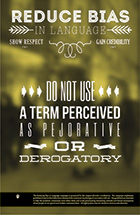
Using one group (often your own) as the standard may be perceived as trying to dominate over other groups
Examples:
- The following phrases may imply one group dominating over another group:
- Instead of man and wife, use man and woman or husband and wife.
- Instead of normal woman and lesbians, use heterosexual women and lesbians.
- Instead of wives, use spouses.
- Instead of mothering, use parenting.
- Order of presentation of social groups can also imply that the first mentioned group dominates the later mentioned groups.
- Instead of white Americans and racial minorities, use racial minorities and white Americans.
- Referring to a group as deprived implies one group’s culture is universally accepted as the standard over another group’s culture.
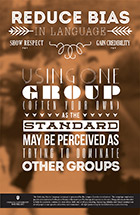
When in doubt, be more specific when describing someone’s background (i.e. nationality, tribe, ethnicity, sexual orientation)
Examples:
- Instead of Asian American, use Chinese American when nationality is known.
- Instead of Hispanic American, use Mexican American when nationality is known.
- Instead of homosexuals, use gay men, lesbians, or bisexual individuals when sexual orientation is known.
- Instead of American Indian, use Shawnee when tribal affiliation is known.
- Instead of sexual preference, use sexual orientation.
- Be clear if you mean one sex or both sexes when referring to gender roles. Instead of he, use person or use plural pronouns like their.
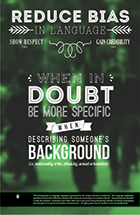
BE AN UPSTANDER. DECIDE TO ACT OR INTERVENE.
Aguilar (2006) defines bias as "a predisposition to see things or people in a certain way...you can be predisposed to see others in a negative light, based on their appearance, group kinships, or differences from you" (p.9). Biases are thoughts until they are acted upon and received by others. The reason it is important to strive to be bias-free is to be intentional about conveying respect and to help the audience or listener feel included.
When you encounter stereotypes, offensive or biased comments, try one of these techniques:
- Acknowledge their good intention and explain the impact or how it bothers you or others.
- Ask a question like "What did you say?" or "What did you mean?"
- Interrupt and redirect the conversation such as changing the subject or allowing the person to change the direction of the statement. You can also physically intervene by walking away from (leaving) the conversation.
- Broaden the stereotype to universal human behavior, since the stereotype is attributing something to a certain group.
- Or the opposite, make it individual by asking the person to apply the comment to "someone in particular" rather than fixed to an entire group.
- Say "Ouch!" It can be used simply to covey what was said had a negative impact on you regardless if it was directed toward you.
"Ouch! That Stereotype Hurts" information above was used with permission from Leslie Aguilar.
Sources:
Aguilar, L.C. (2006). Ouch! That stereotype hurts: Communicating respectfully in a diverse world. Flower Mound, TX: Walk the Talk Co.
American Psychological Association (2010). Publication manual of the American Psychological Association (6th ed.). Washington, DC: Author.
Governor’s Council for People with Disabilities (2013). The power of words: A guide to interacting with people with disabilities.
Indiana University (2013). Indiana University style guide.




